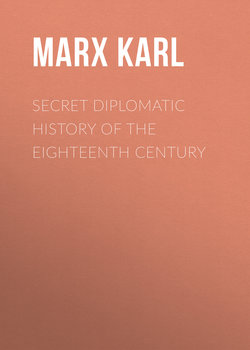Secret Diplomatic History of The Eighteenth Century

Реклама. ООО «ЛитРес», ИНН: 7719571260.
Оглавление
Marx Karl. Secret Diplomatic History of The Eighteenth Century
CHAPTER I
CHAPTER II
CHAPTER III
CHAPTER IV
CHAPTER V
CHAPTER VI
Отрывок из книги
The documents published in the first chapter extend from the reign of the Empress Ann to the commencement of the reign of the Emperor Paul, thus encompassing the greater part of the 18th century. At the end of that century it had become, as stated by the Rev. Mr. Pitt, the openly professed and orthodox dogma of English diplomacy, "that the ties which bind Great Britain to the Russian Empire are formed by nature, and inviolable."
In perusing these documents, there is something that startles us even more than their contents – viz., their form. All these letters are "confidential," "private," "secret," "most secret"; but in spite of secrecy, privacy, and confidence, the English statesmen converse among each other about Russia and her rulers in a tone of awful reserve, abject servility, and cynical submission, which would strike us even in the public despatches of Russian statesmen. To conceal intrigues against foreign nations secrecy is recurred to by Russian diplomatists. The same method is adopted by English diplomatists freely to express their devotion to a foreign Court. The secret despatches of Russian diplomatists are fumigated with some equivocal perfume. It is one part the fumée de fausseté, as the Duke of St. Simon has it, and the other part that coquettish display of one's own superiority and cunning which stamps upon the reports of the French Secret Police their indelible character. Even the master despatches of Pozzo di Borgo are tainted with this common blot of the litérature de mauvais lieu. In this point the English secret despatches prove much superior. They do not affect superiority but silliness. For instance, can there be anything more silly than Mr. Rondeau informing Horace Walpole that he has betrayed to the Russian Minister the letters addressed by the Turkish Grand Vizier to the King of England, but that he had told "at the same time those gentlemen that as there were several hard reflections on the Russian Court he should not have communicated them, if they had not been so anxious to see them," and then told their excellencies not to tell the Porte that they had seen them (those letters)! At first view the infamy of the act is drowned in the silliness of the man. Or, take Sir George Macartney. Can there be anything more silly than his happiness that Russia seemed "reasonable" enough not to expect that England "should pay the WHOLE EXPENSES" for Russia's "choosing to take the lead at Stockholm"; or his "flattering himself" that he had "persuaded the Russian Court" not to be so "unreasonable" as to ask from England, in a time of peace, subsidies for a time of war against Turkey (then the ally of England); or his warning the Earl of Sandwich "not to mention" to the Russian Ambassador at London the secrets mentioned to himself by the Russian Chancellor at St. Petersburg? Or can there be anything more silly than Sir James Harris confidentially whispering into the ear of Lord Grantham that Catherine II. was devoid of "judgment, precision of idea, reflection, and l'esprit de combinaison"?20
.....
Everything being ready for the invasion of Schonen, there arose a difficulty from a side where it was least expected. Although the treaty stipulated only for 30,000 Muscovites, Peter, in his magnanimity, had landed 40,000 on Zealand; but now that he was to send them on the errand to Schonen, he all at once discovered that out of the 40,000 he could spare but 15,000. This declaration not only paralysed the military plan of the confederates, it seemed to threaten the security of Denmark and of Frederick IV., its king, as great part of the Muscovite army, supported by the Russian fleet, occupied Copenhagen. One of the generals of Frederick proposed suddenly to fall with the Danish cavalry upon the Muscovites and to exterminate them, while the English men-of-war should burn the Russian fleet. Averse to any perfidy which required some greatness of will, some force of character, and some contempt of personal danger, Frederick IV. rejected the bold proposal, and limited himself to assuming an attitude of defence. He then wrote a begging letter to the Czar, intimating that he had given up his Schonen fancy, and requested the Czar to do the same and find his way home: a request the latter could not but comply with. When Peter at last left Denmark with his army, the Danish Court thought fit to communicate to the Courts of Europe a public account of the incidents and transactions which had frustrated the intended descent upon Schonen – and this document forms the starting point of The Northern Crisis.
In a letter addressed to Baron Görtz, dated from London, January 23, 1717, by Count Gyllenborg, there occur some passages in which the latter, the then Swedish ambassador at the Court of St. James's, seems to profess himself the author of The Northern Crisis, the title of which he does not, however, quote. Yet any idea of his having written that powerful pamphlet will disappear before the slightest perusal of the Count's authenticated writings, such as his letters to Görtz.
.....